|

1926: Glasgow Accies complete a hatrick of Scottish Championships and saw a 100% record. The first Scottish team to beat England at Twickenham included 4 Accies and 3 High School players. This team included Jimmie Ireland. Glasgow Accies invite the N.Z Maori who were touring England and France to play in Glasgow,but SRU refuse to sanction match
"The class of 1926 were real giants of their time by Neil Drysdale
Twickenham has always been an inauspicious place for Scots intent on seizing the Calcutta Cup from their English rivals. Indeed, ever since the sweet charioteers moved into the stadium, assorted tribes of Saltire-wielding fans have flocked down to Richmond and seen their hopes dashed.
The SRU's finest have only tasted victory on four occasions - in 1926, 1938, 1971 and 1983 - and though there is some justified optimism ahead of this afternoon's clash, it should be tempered by the realisation that good Scotland sides have travelled south before and gradually been shrouded in a welter of gloom.
Yet, in March 1926, there was no sense of foreboding as the match approached. On the contrary, having secured their first grand slam the previous season, redoubtable customers in the mould of Ian Smith, Dan Drysdale, Jimmy Ireland, John Bannerman and Herbert Waddell embraced the trip to London with the enthusiasm which was typical of the period.


The Players - JC Dykes, JB Nelson, DJ MacMyn, JW Scott, JCH Ireland, R Howie, Ian S Smith, GG Aitken, AC Wallace, JM Bannerman, D Drysdale (captain), JCR Buchanan, DS Davies, H Waddell, JR Paterson
There was none of the endless hype which surrounds modern-day rugby. Instead, the team left Glasgow's Central Station on the Friday night, after finishing work, and tactics were confined to a brief pre-match discussion, prior to the main event.
If it sounds basic, that's because it was, and the effervescent Bannerman once asked a colleague on the train through to Murrayfield: "Who is it we are playing today, Ireland or Wales?"
But once they marched on to the pitch, these fellows were giants of the game and while Bannerman may not have been a stickler for punctuality or remotely interested in rigorous analysis of opponents, he participated in 37 consecutive matches, all but one of them in the Five Nations Championships, between 1921 and 1929, and celebrated no less than four victories over the English, the last of them as captain.
From this distance, such riches seem implausible, but the afternoon of that maiden triumph was typical of the domination which a terrific group of backs and a coruscating pack enjoyed over their traditional foes.
Straight from the outset, they grabbed the initiative, with tries from Smith and Waddell and a drop goal (then worth four points) from Jimmy Dykes. They led 14-3 at the interval, with The Times marvelling at the "quicksilver pace" of the visitors.
Obviously, they were amateurs and had to fit in rugby around their day jobs, but they used to train at lunch-times, which was unheard of in the 1920s, and they had a marvellous pace and fitness
Brian Simmers
Although England rallied upon the resumption, another Smith try sealed a 17-9 success and nobody could argue that they didn't merit their win. At the denouement, the legendary hooker, Jimmy Ireland, exchanged jerseys with his opposite number, Sam Tucker, and was promptly billed for 12/6 by the SRU.
But these fellows headed home as heroesand Bannerman regaled his confreres with a selection of Gaelic songs, which intimated there was no better feeling than beating the English.
Glancing down the teamsheet, one of the most obvious features is the significance of Glasgow's impact on the national side with seven representatives in the XV. (In these days, there were no replacements and if somebody picked up an injury, they had to continue or leave their ranks reduced to 14 men).
>Dykes, Waddell, Jimmy Nelson and Max Simmers were all Accies stalwarts, while Ireland, Bannerman and Gordon Boyd turned out for the Glasgow HSFP club, and as Brian Simmers, Max's son, recalls, this was a halcyon period for the second city of Empire.
"Obviously, they were amateurs and had to fit in rugby around their day jobs, but they used to train at lunch-times, which was unheard of in the 1920s, and they had a marvellous pace and fitness," says the chairman of Glasgow Hawks, who himself gained seven Scotland caps in the 1960s.
"Max was a chartered accountant and 1926 was the first season he played for Scotland in the centre, but he went on to amass 28 caps, which was a sizeable number in the time before you had autumn internationals and summer tours.
"This was an era when Glasgow Accies used to regularly attract 10,000-strong crowds for club games and rugby was so popular that the keynote fixture against Heriot's once had to be moved to Inverleith to accommodate the 15,000 spectators. Extraordinary, when you think what the audiences are today.
"But you have to understand that Twickenham didn't at that stage have the reputation it has subsequently built up as a graveyard of Scottish hopes, and there was no fear, no trepidation about going down there and tackling England.
"Now, you have an us and them' situation, and a sense of animosity has reared its head, but in the '20s, a lot of our boys played for the Barbarians or the university sides with the RFU lads, and they just wanted to do their best for their country.
"John Bannerman, for instance, was this big Highlander, and he was remarkably resilient and tenacious and wouldn't lie down to anybody and his record speaks for itself.
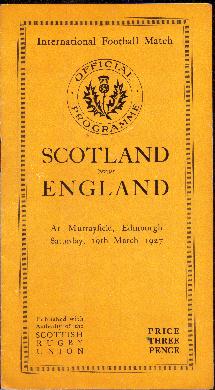
"But, naturally, it was a completely different age: the two big Glasgow clubs were very powerful and even the London press used to highlight the Accies backline which, with hindsight, was incredibly talented."
For his part, Bannerman was imperious in leading the rout at Twickenham, and as his grandson, Shade Munro, another ex-internationalist and current Glasgow assistant coach, recollects, the lock was fired up on these occasions as for no other.
"I have a picture of him skippering the Scots to victory at Murrayfield and the pride in his eyes is absolutely immense," says Munro. "In these days, the Five Nations journeys down to England were grand occasions, and although my grandad always offered 100% in his nation's cause, he would prepare even harder for the Calcutta Cup. There were quite a few Gaelic speakers in the side and they didn't half work themselves up. It must have worked, though.
"Four victories in five years was pretty amazing and we would certainly take another result like that of 1926 today, wouldn't we? Actually, I think we have a chance, but it's a hard one to call, because there are so many new guys in the mix. Still, if we go out there with the same attitude as John Bannerman, we will not be too far away."
Simmers died in 1972 and Bannerman succumbed to lung cancer in 1969 - "They all used to smoke like chimneys," says Munro - but not before the latter had become a life peer in the House of Lords. (His daughter, Rae Michie, was the former Liberal Democrat MP for Argyll and Bute and is now a baroness in the upper chamber)."
1927: Old Anniesland Memorial Pavilion opened.
1930: Accies Internationalists Jimmy Nelson and Max Simmers help to organise two benefit matches to assist West who at that time were in financial difficulties. Playing in these matches were such as Herbert Waddell,Jimmie Ireland,Ian Shaw and J.M.Bannerman
 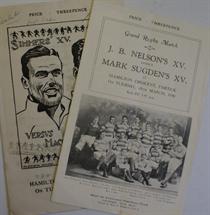
The Scottish Championship came to New Anniesland in 4 out of 6 seasons to 1926
Up to Season 1932/33 no season saw more than 5 defeats
1936: Glasgow High wins Scottish Club Championship.

Wilson Shaw in 1936 Lions to Argentina
1938: Wilson Shaw Glasgow High captains Scotland to the Triple Crown
Wilson Shaw
Robert Wilson Shaw, CBE
(1913 - 1979)
Rugby Union
Shaw played club rugby for Glasgow High School Former Pupils. He was the captain of the Scottish rugby team that won the Triple Crown in 1938. The match is remembered as 'Wilson Shaw's match'. The Triple Crown was achieved by beating Ireland, Wales and England. Scotland would not manage to do so again for another forty years! In the match against England, he had scored a try and created another. In the last minute he set off on a mazy run and scored another try to win the match 21-16 and the Triple Crown. The victory was made all the sweeter for the Scots as it was achieved at Twickenham.
Captain of Scotland's Triple Crown winning rugby team, 1938
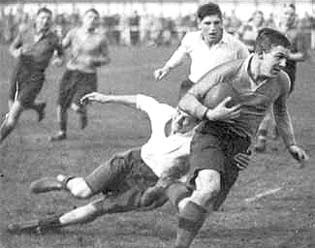
TWICKENHAM WALL OF FAME
Inducted: England v Scotland (3/02/07)
Robert Wilson Shaw (Scotland)
It was a Calcutta Cup match, but not just any match between the auld enemies.
This England v Scotland confrontation at Twickenham in 1938 was something
very special. Indeed so special was it that it was to go down in history as the
Wilson Shaw match, in honour of the stunning performan
ce by one man.
Wilson Shaw, who went on to become President of the Scottish Rugby Union in
1970-71, set the old ground alight with as scintillating a display as you could
hope to see.
And while the new stadium at Twickenham boasts crowds of 80,000 plus, just
before the outbreak of the Second World War some 70,000 English and Scottish
rugby supporters crammed the ground for one of the most thrilling games pre- or
post-war that there has ever been.
The lead changed times frequently. The balance of the match tilting first this way,
then that. Wilson Shaw had scored the first of his two tries in the opening 40
minutes, but it was his second, three minutes from full time, which clinched the
game and earned Scotland only their second victory at Twickenham.
And in between and all around those two tries Wilson Shaw was an inspiration to
his men as they and their English counterparts produced a dazzling exhibition of
open running rugby that kept the crowd on its toes throughout.
It is for that reason that the Museum of Rugby at Twickenham has inducted
Wilson Shaw, who died in the summer of 1979, to the Wall of Fame. He should
be remembered for more than one match, rugby was his life and he was
justifiably and deservedly appointed CBE.
Wilson Shaw toured Argentina with a British team in 1936
1938 Lions to South Africa including Laurie Duff
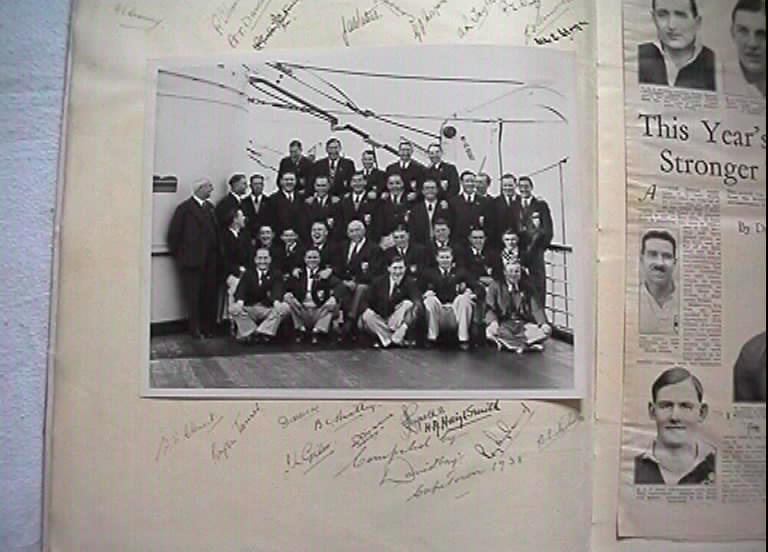
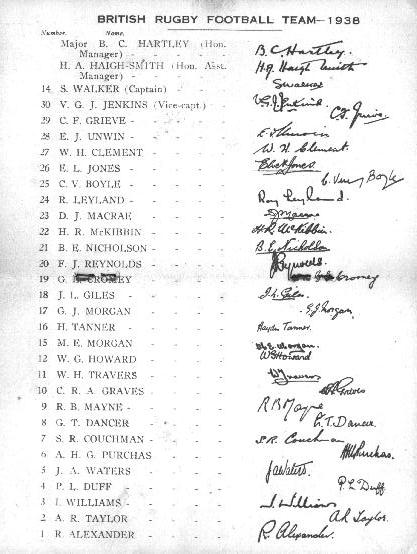
1939: Old Anniesland Pavilion taken over by The Army
1940: The Outcasts made up of Accies, Kelvinside Accies, High school and Hillhead play at Balgray. Glasgow/Edinburgh Team beat an Army XV at Old Anniesland.
1946; Russell Bruce Accies captains Scotland to a 27-0 win over England at Murrayfield--on the same day as Scotland defeat England 1-0 at Hampden
NEIL DRYSDALE INTERVIEWS RUSSELL BRUCE
1946 DUAL VICTORY PIECE
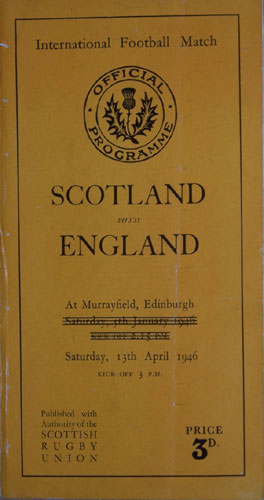
It was a memorable afterno
on in Scottish sporting history which seems to have slipped into obscurity. On April 13, 1946, as a nation celebrated the end of war en
masse, Scotland, for the first and only time in their history, locked horns with England in football and rugby at Hampden Park and Murrayfield – and won both contests.
Over 200,000 spectators packed into the grounds for these victory Internationals and whether in saluting the likes Wallace Deas, Doug Elliot and Russell Bruce orchestrate a record-breaking 27-0 success in Edinburgh – and this when a try was only worth three points – or in unleashing their pent-up tension with a Hampden Roar of truly gargantuan proportions, following Jimmy Delaney's 89th-minute winner, there was an outbreak of national celebration, reflecting the fact that with Hitler defeated, the Auld Enemy could now be re-established as the team which it was most important to beat.
Even at this juncture, with the majority of the protagonists long dead, the nature of much of the reportage conveys the makeshift nature of the supporter' pleasures. The Sunday Post splashed the story on their front page with the headline: "A Great Day for Scotland" and relates how young children pushed prams, packed with pies, outside the ground, and vendors advertised "three corned beef sandwiches for a shilling", whilst 139,000 fans, many of them carrying bottles of alcohol, stood, squeezed together in a huddle, with aficionados from both countries in the same company. (This was before segregation was introduced). "It was a terrific atmosphere, and there was nary a hint of trouble, because you have to remember that most of these men had fighting side by side against the Germans just a few months earlier" recalls the veteran broadcaster, Bob Crampsey, who was amidst the throng. "We had been thrashed 6-1 by the English in Glasgow the previous year – many of our nest players were out in the Far East or Africa, whereas a lot of theirs seemed to be stationed at places like Aldershot - so there were no huge expectations, but the longer the match progressed, the more dominant the hosts became, and then suddenly, Jackie Husband flighted a free kick out on the left across the Mount Florida goal end, Willie Waddell touched it into the box, and Delaney, whom I recollect was in a suspiciously offside position, crashed it into the net behind Frank Swift.
"Well, the whole auditorium erupted. In the minutes afterwards, you couldn't hear yourself think, and I recall a jubilant wee spectator rushing onto the field to congratulate the home players. Two policemen nabbed him and led him back to his seat, but not before he had thrown his hat in the air half a dozen times, and danced a jig with the constabulary hanging on to him. It was a situation which basically summed up the occasion – intrinsically innocent, laced with humour and this from a crowd who enjoyed their "wee drappies" at the interval. One Englishmen lent a bottle opener to a Scot, who responded with the offer of a biscuit. And there wasn't a single arrest by the 400 policemen, although there was plenty of joshing of the coppers with one Glaswegian asking a chap on a white police whether he couldn't have found a tartan cuddy for a few hours."
Similar exultation was evident at Murrayfield, where the Scots, led by Deas, produced the sort of stirring forward display which will be required by their professional successors at Murrayfield tonight. Sitting in the living room of his home in Killearn, Russell Bruce, now 87, but possessed of a verbal dexterity which wouldn't disgrace a fellow 10 or 20 years younger, ran me through the narrative of an encounter where the home pack were in almost complete control from the outset, eventually running in half-a-dozen tries, three conversions and a penalty (had the match been fought out under the current scoring system, they would have prevailed 39-0, which underlines their superiority).
"It was a pretty decent demolition and amply compensated for the fact we had lost 12-8 at Twickenham just a month earlier, when we should really have won – both Doug Elliot and I went for the man rather than the ball in the final moment, and we squandered a glorious opportunity to wrap up victory," says Bruce, a Glasgow Academical, who was part of the Anti-Aircraft Command, who campaigned across Europe in 1944 and 1945. But, to be honest, that was a pretty strong Scottish side, and were supremely fit, and the big lads in the mould of Wallace, Doug, Frank Coutts and John Orr snaffled ball from their opponents so regularly that chances were served up on a regular basis.
"But it was another time, another place. While I was in the army, we had a mix of boys from union and league and we all got on well together. Why not? Anyway, in 1944, there was a suggestion that we should organise a game – RU v RL – in Bradford, and I was keen to be involved. But the SRU refused and made it quite clear that if I did participate, that I could forget about being picked for the international team in the future."
I love this anecdote and the notion that, in the midst of a global conflagration, with the future of the free world at stake, that the blazerati, harrumphing into their G & Ts. remained hell-bent on implementing the regulations to the nth degree. It has Captain Mainwaring's imprimatur all over it, yet the more Bruce reminisced, even as pheasants waddled around in the garden, the feeling increased that Jason White's personnel would be well advised to emulate the tactics which drove the English to near-despair.
"We were in their faces from the outset, and an audience of more than 60,000 offered us incredible support, so it was an uplifting afternoon. We tackled as if our lives depended on it, we varied our angles of attack, and we never allowed them to develop any pattern, and we kept putting points on the board when we were in their territory. We were only in front 9-0 at half-time – I had managed to score a try after one of their lads booted the ball into my hands – but we were a confident bunch and we never relented for a second, to the stage where they were out on their feet. It was all Scotland in the second period and there were tries for Ian Lumsden, Gordon Watt, Billy MacLennan and Billy Munro and the last of these was an absolute beauty. He was released by Lumsden and shimmied and feinted his way past the English defence, selling this lovely dummy, and touching down."
"At the climax, the supporters stood to acclaim us and then we heard the news from Hampden and it all capped a remarkable day for Scottish sport. We went on to win the unofficial championship, including a victory over the New Zealand Army side, known as the Kiwis, who were effectively the All Blacks in everything but name. They had already demolished Ireland and Wales, and they performed their haka before the kick-off, but we weren't intimidated and beat them 11-6, so it was a pretty decent effort from us."
Back at Hampde
n, on that April 13 evening, his contemporaries were understandably triumphant. Their line-up featured the Shaw brothers, Jock and Davie, and Frank Brennan, all of whom were born and brought up in miners' rows in Annathill, within about 100 yards of one another, and they also boasted Scot Symon, a dual internationalist in football and cricket and subsequent Rangers
manager (the England maestro, Denis Compton, was in the opposition ranks). "In their next match a month further on, Scotland beat Switzerland
3-1, so it wasn't as if the England result was any fluke," says Jim Guy of the Scottish Football Museum. "On the contrary, these were men who had been a band of brothers on the battlefield and they brought the same amount of camaraderie and commitment to their exertions on the football pitch. We should be proud of them."
At his home, en route to The Trossachs, Bruce will this evening be cheering on White's team in the Calcutta Cup clash. He used to invite old comrades from both nations to reunion parties, but as the years elapse, there is less and less need for invitation cards. "It's inevitable, and you grow used to it, but I'll have a few friends around, and if Scotland can play as they did against France, I genuinely believe they can pull off a shock," says Bruce. "Ultimately, I think this is an anonymous English team and I'm not overly impressed with them, particularly if we can hold them in the scrums, so the Scots should go out and express themselves and who knows what might happen? There is certainly no need for them to be frightened by their adversaries."
And as somebody connected with one of the most auspicious Saturdays in the chronicles of the SFA and SRU, he speaks with greater authority than most.
1948: Legendary commentator Bill McLaren played his last match for Hawick on the September Holiday Monday against Accies prior to his premature retirement having been diagnosed with Tuberculosis
1945/51: Kelvinside Accies combine with West to play as Kelvinside West
1947: 12,000 attend Cammanachd Cup Shinty final at Old Anniesland
1951,1954: Glasgow High win Scottish Championships.during this period West play regularly at Old Anniesland having been evicted from Hamilton Crescent. West at this time also obtained agreement from Accies and GHSFP to retain gate money from matches played at Anniesland but classified as "home" matches for West
Angus Cameron GHSFP,Hamish Dawson Glas Ac and R. C. Taylor Kelvinside Accies play in Scottish side beaten 44-0 by South Africa
1953: Donald Cameron, Hamish Kemp GHSFP Alan Waddell and Hamish Dawson Accies play for Glasgow/Edinburgh against the All Blacks at Old Anniesland.The All Blacks captained by Bob Stuart included the legendary Bob Scott at full back.
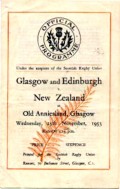
1955: Angus Cameron Glasgow High appointed vice captain of the British Lions in South Africa when they beat the Springboks at Ellis Park Johannesburg.

1956: The Scottish Rugby Union publish the coaching manual "Raise the Standard" under the presidency of Max Simmers
1955: Glasgow Accies share disputed Scottish Championship with Boroughmuir and Hawick.The "Unofficial Championship"was recognised in different ways by various national newspapers. At this time New Anniesland plays host to a Scotland v England Womens Hockey International.
1957: Owing to clash of fixtures Gala could not play the normal September weekend fixture Accies play Kelvinside Ac
cies at Netherdale.
1960 ; Hamish Kemp selected for Scotland/Ireland v England/Wales
1962: Glasgow High win the Scottish Championship under the captaincy of Ian Docherty
1966: Glasgow Accies celebrate their centenary with a match betwen SRU Founder Members and the Rest of Scotland
1969: Accies host their first Easter Sevens Tournament which took place on an annual basis for 30 years.Winners included London Scottish,Rosslyn Park,Loughborough Colleges and Western Province.
1971: Glasgow High go "open"
1973: The introduction of League Rugby.
1982: Glasgow High play their last match against Kelvinside Accies. Glasgow High and Kelvinside Accies amalgamate as GHK
1984: John Beattie plays for Scotland's Grand Slam winning Team - John also played for the British Lions.

1988: Accies play the Barbarians at New Anniesland in the Herbert Waddell Memorial Match.The Barbarians team included Will Carling of England and Jonathon Davies of Wales
1993: Old Anniesland hosts Scotland A against New Zealand A.

1994: Scottish Districts play the Springboks at Old Anniesland.
1997: Glasgow Accies and GHK combine at senior level to form Glasgow Hawks under the chairmanship of Brian Simmers. GHK wins Scottish Shield. False Bay from Cape Town play Accies and GHK. This was one of the first mixed coloured teams to leave South Africa after apartheid.
1998: Hawks win Scottish Cup , Scottish Second Division Championship and 2nd xv League Champions.. Hawks beat Toulouse at Old Anniesland. Hawks 2xv win The Inter-City 2xv league Division 1. Derek Stark and Glenn Metcalfe become the first Hawks to win S
cottish Caps. Accies tour Zimbabwe
1999: Kelvinside Academy sells Auchenhowie pitches to Rangers F.C to develop a Soccer Academy
Hawks play Athletico Rosario from Argentina
2000: Hawks lose to Boroughmuir in the Scottish Cup Final. The opening of the Jimmie Ireland Stand at Old Anniesland. The occasion being marked by a match between Hawks and the Co -Optimists. Hawks combine with West to play the Co-optimists to mark the opening of the new stand at Burnbrae
2001 Glasgow Accies and GHK go back into the National Leagues. GHK and Accies become "associate clubs". Andy Henderson wins his first cap against Ireland.
2002: Hawks lose 17-20(after extra time) to Hawick in the Scottish Cup Final Accies tour North Carolina. Scotland lose 8-58 to England in an "amateur" Rugby League at Old Anniesland. Hawks play Malone in Belfast
2003: Runner up in Integrated
Tournament(Pro-Am). Hawks tour South Africa and win all three matches
2004: Hawks win Premier 1 Championship, Scottish Cup and 2nd xv Championship-Glasgow Accies runners up in Shield
Scotland play Wales in RL international at Old Anniesland
2005: Hawks retain Premier 1 Championship and 2nd xv League Championship
Winners of the inaugural Murrayfield Sevens
Accies celebrate 100 years of rugby at New Anniesland.
Hawks beat Racing Club of France in Paris
2006: When Hawks secured the hatrick of Championships at Meggetland it was the first time in 80 years that a club from Glasgow has achieved this honour.You have to go back to 1926 when Glasgow Accies completed three in a row and before that it has only ever been done twice Glasgow Accies in 1874 and West in 1892
Hawks play in Rome and lose to Capitolina
![[click to close]](../images/photos/1763.jpg)
2007 Hawks win the Scottish Cup for the third time beating Edinburgh Accies in the final and GHK win the Plate beating Crieff on the same day
2006 Six Hawks capped for Club International XV
Steven Duffy, Richie Maxton, Murray Strang, Sandy Warnock, Stewart Smith, Mike Adamson
2009 Hawks win Scottish Shield beating Peebles in the Final and inaugural Black Grouse Trophy(15aside tournament)
2011 Hawks play Belfast Harlequins at Deramore Park
2012 Hawks relegated from Premiership
2013 Hawks win National League and return to Premiership --West Regional Cup Runners up
2014 Hawks win West Regional Cup Reserve League Champions Scottish Cup Runners up and hold Bill McLaren Shield
NEW ANNIESLAND HISTORY
The best? The answer is surely Academical-from The Herald 27 August 2005
THE cost of hiring the marquee in which almost 500 Glasgow Academicals will tonight celebrate their centenary at the New Anniesland sports ground, is greater than the £10,683 which the school paid for the land itself, plus building the pavilion, groundsman's house, and grandstand 100 years ago.
Just how sound that investment has proved we learned from Billy Mann, who is helping organise festivities.
The club were members of the Rugby Football Union before the Scottish Rugby Union was founded in GlasgowAcademy itself in 1873, and the school has produced more than 80 Scottish internationalists as well as 10 cricket caps and many international athletes.
Glasgow Academical Football Club did not find it necessary to include "rugby" in its title when they formed in 1866. "Association" football was born the next year, with the formation of Queen's Park.
GlasgowHawks (a merger of Accies and Glasgow High/ Kelvinside) are now arguably the dominant Scottish rugby force, national champions for the past two years. Yet they must envy Accies' previous golden ages: just 11matches lost in their first 16 years during which six Academicals played in the inaugural Scotland v England international, and a remarkable post First World War era when Anniesland matches drew crowds of up to 10,000. Special trains ran from Edinburgh and, when they met their rivals Heriot's, the game had to be played on the international ground at Inverleith, attracting 18,000.
Academicals were considered by The Times to be "easily the best club in the British Isles", and the writer exhorted "English rugger enthusiasts to take the trouble to go to Glasgow on a Friday evening by the "sleeper" to see Glasgow Academicals who would probably beat, and beat easily, any London club".
This was all the more remarkable considering battlefield ravages on the sports field.
From 1901 to 14, the club had been Scottish rugby champions three times. The 1903-05 captain was Louis Greig, a Scotland internationalist and British Lion who became the confidant of the future King George VI and his tennis partner at Wimbledon.
All of the XV which beat West of Scotland 27-8 in the last game of the 1914 season enlisted on the outbreak of war. Eight were killed, six were wounded, and only one returned unscathed. Three were awarded the Military Cross. Three died on June 18 1915 at Gallipoli, yet nine otherAccies FPs, all Cameronian officers, were killed at Souvla Bay that same day.
Despite these casualties, from 1921 to 1926 the rebuilt Accies rugby XV played 123, won 111, drew 2, lost 10. They were beaten only six times by Scottish clubs, scoring 3069 points for the loss of 482. So high was their status that the New Zealand Maori wanted to play them. The SRU refused to sanction the game.
Their luminaries included Herbert Waddell (stand-off in the 1925 Scotland grand slam side) who was memorably billed by the SRU for the fire which he asked to be lit in his room at the North British Hotel, the team's pre-match headquarters, and Max Simmers.
Before settling at New Anniesland, the school had three previous grounds, the first at Burnbank, between Great Western Road and Woodlands Road. When Accies moved out, it became the home of a football club, newly moved from public pitches at Glasgow Green. Yes, Rangers. They stayed a year before moving to Kinning Park. Burnbank was where Glasgow Academy Sports was launched in 1868. It is the oldest surviving athletics meeting in the West of Scotland.
The club produced several outstanding international athletes, including John McIsaac who helped Britain to European 4 x 400m gold in 1958, Robert Stronach, a rugby internationalist who won three successive AAA 120 yards hurdles titles, and more recently Alastair Douglas, Pat McLaggan, and Hugh Barrow who was once teenage world record-holder for the mile, and is now secretary of the Hawks.
Cricket was the dominant sport when the club was founded in 1866 (and was Scotland's major team sport until the latter part of the 19th century). In the 1930s, as many as five internationalists played in the first XI, including rugby and golf "caps", but three of the most promising players were killed in the Second World War. However, more recently, Dougie Lockhart has now represented Scotland more than 100 times.
The school once had its own curling pond and has also hosted international women's hockey and lacrosse.
There's a fine old tradition to celebrate tonight, and it's sobering to reflect that £10,000 won't cover the bar bill.
Hawks Captains:
1997/98 David Wilson
1998/99 David Wilson
1999/00 Scott Hutton
2000/01 Scott Hutton
2001/02 Chris Docherty
2002/03 Iain Leighton
2003/04 Chris Docherty
2004/05 Eric Milligan
2005/06 Erc Milligan
2006-07 Steven Duffy
2007-08 Mark Sitch
2008-09 Steven Duffy/Ian Noble
2009-10 Nick Cox/Rory Mackay
2010-11 Rory Mckay
2011-12 Rory McKay/Peter Jericevich
2012-13 Ross Miller/Andy Linton
Director Of Rugby
1997/99 Iain Russell
1999/00 Kenny Hamilton
2000/O7 John Roxburgh
2007-08 Hamish Fyfe
2008-09 Peter Wright
2009-2011 Peter Wright
2011-2012 Peter Wright
2012-2013 Kenny Hamilton
2013-2014 Kenny Hamilton
Hawks Coaches
1997/98 Iain Russell/Bill Macdonald
1998/99 Iain Russell/BillMacdonald
1999/00 Bill Macdonald/Shade Munro
2000/01 Shade Munro/David Wilson
2001/02 Shade Munro/Jim Barrie
2002/03 Shade Munro/Jim Barrie
2003/04 Peter Wright/Rob Ackerman
2004/05 Peter Wright/Rob Ackerman/Colin Ireland
2005/06 David Wilson/Mark Sitch
2006/07 David Wilson/David Cockburn
2007/08 David Wilson/David Cockburn/Fergus Wallace
2008-09 Peter Wright/David Wilson/Jamie Dempsey
2009-2010 Peter Wright/Jamie Dempsey/Chris Reid
2010-2011 Peter Wright/Jamie Dempsey/Chris Reid
2011-2012 Peter Wright/Jamie Dempsey/Jimmy Sinclair
2012-2013 Jamie Dempsey/Jimmie Sinclair
2013-2014 Jamie Dempsey/Jimmie Sinclair/Cammy Little
Officials:
Chairman:
1997/98 Brian Simmers
1998/99 Brian Simmers
1999/00 Brian Simmers
2000/01 Brian Simmers
2001/02 Brian Simmers
2002/03 Tom Howie
2003/04 Tom Howie
2004/05 Brian Simmers
2005/06 Kenny Hamilton
2006/07 Kenny Hamilton
2007/08 Kenny Hamilton
2008/09 Kenny Baillie
2009/11 Alan Macintosh
2011/13 Alasdair Graham
2013/14 Chas Afuakwah
Secretary:
1997/2007 Hugh Barrow
2007/13 Gordon McCallum
2013/14 Andy Syme
Treasurer:
1997/03 Richard Eadie
2003/12 Kenny Wilson
Chief Executive:
2008/09 Kenny Baillie
Glasgow Hawks Sports Trust Chairman
2009 David Mackay
2012 David Maclay
Hawks Players Capped
Glenn Metcalfe
Gordon McIlwham
Derek Stark
Andy Henderson
Tom Philip
Graeme Morrison
Rory Lamont
Kenny Sinclair(Sevens)
Euan Murray
Scott Forrest (Sevens)
Fergus Thomson
Rory Kerr
John Fitzpatrick (Sevens)
Mike Adamson (Sevens)
Max Evans
Ruaridh Jackson (Sevens)
Colin Shaw (Sevens)
Jamie Hunter (Sevens)
Richie Gray
Ross Miller (Sevens)
Kerr Gossman(Sevens)
Duncan Weir
Murray Strang UAE (Sevens)
Ally Maclay Hong Kong
Rory Hughes(Sevens)
Craig Gossman (Sevens)
Hawks Players Awarded S.R.U./Glasgow/Edinburgh Contracts/pro contracts
Danny Ablett 1997
Stephen Begley 1997
Gordon Mackay 1997
Chris Simmers 1997
Matt McGrandles 1997
Ally Common 1998
Glenn Metcalfe 1997
Shade Munro 1997
Murray Wallace 1997
Fergus Wallace 1997
Derek Stark 1997
Cammy Little 1997
Chas Afuakwah 1997
Mike Beckham 1997
Danny Porte 1997
Tommy Hayes 1998
Gordon Mcilwham 1998
Andy Henderson 2001
Euan Murray 2001(S.R.U. Scholarship)
Rory Mckay 2002
Tom Philip 2002
Kenny Sinclair 2002
Steve Gordon 2002(S.R.U. Scholarship)
Graeme Morrison 2003
Euan Murray 2003
Steven Duffy 2004
Fergus Thomson 2004
Rory Lamont 2004
John Barclay 2004
Stewart Smith 2004--Waikato Academy/Narbonne
Colin Shaw 2005
Steve Swindall 2005
Scott Forrest 2005
Iain Kennedy 2005
Mike Adamson 2006
Iain Monaghan 2006 Viadana Italy
Max Evans 2007
Ross McCann 2007 Viadana Italy
Richie Gray
Ruaridh Jackson 2009
Duncan Weir 2010
George Hunter
Kerr Gossman
Nick Campbell
Allocated Pro Players
2002/03: Andy Kelly (Glasgow), Kenny Sinclair (Glasgow)
2003/04: Andy Henderson, Glenn Metcalfe, Graeme Morrison, Dan Parks
2005/06 Paul Dearlove,Scott Lawson,Graydon Staniforth
Drafted Pro Players
2003 Cameron Blades (Glasgow) Ian McInroy (Glasgow) Alistair Davidson (Borders)
2005 Thom Evans,Steven Turnbull Graeme Morrison,Colin Shaw,Steve Swindall
2010 Ryan Grant,Ally Muldowney,Colin Shaw Kevin Tkachuk,Andrew Kelly,Estevan Lozado,Duncan Weir,John Welsh
2011 Colin Shaw, Dave McCall, Rob Dewey, Henry Pyrgos, Duncan Weir, Richie Gray and John Barclay
2013 Scott Wight; Tyrone Holmes; Finlay Gillies; Mike Cusack; Jon Welsh; Colin Gregor; Pat MacArthur; Chris Fusaro; DTH van der Merwe and Ryan Grant.
Hawks Coaches Awarded Professional Contracts
Shade Munro 2003 Glasgow Rugby ,Scotland Asst Coach 2004-06
Peter Wright Scotland Under 19,
Hawks Coaches Representative Positions
Peter Wright Scotland under 20s 2009
David Wilson Scotland under 18s 2009
Jamie Dempsey Scottish Women 2009
Jamie Dempsey Scotland Under 17
Scotland "Club "Caps
Steven Duffy 2006
Stewart Smith 2006
Murray Strang 2006-07
Mike Adamson 2006
Sandy Warnock 2006
Richard Maxton 2006
Allan Kelly 2009
Rory Mackay 2010-11-12
Grant Strang 2010
Dean Kelbrick 2011-12
Eric Milligan 2011
Nick Campbell 2011
Jack Steele 2014
Scotland Under 21 Caps
Danny Ablett
Kenny Baillie
Steve Begley
Andy Ness
Andy Henderson
Gordon Mackay
Eric Milligan
Euan Murray
Richard Maxton
Gavin Mories
Graeme Morrison
Tom Philip
Colin Shaw
Steve Gordon
Steve Swindall
Scott Forrest
Fergus Thomson
Ally Maclay
Sandy Warnock
John Maclay
Neil McKenzie
John Malakoty
Mike Adamson
Iain Kennedy
Stephen Biggart
Scotland under 20 caps
Gary Strain
Ruaridh Jackson
Andy White
Peter Jerevich
Nick Campbell
George Hunter
Andy Kirkland
Kerr Gossman
Tom Steven
Sean Yacoubian
Scotland Under 19 caps
Steve Begley
Tom Philip
Richard Maxton
Steve Gordon
Robert Niven
Mike Adamson
Stephen Biggart
Niall Lear
Mike Adamson
James Small
Ross Macdonald
Sam Blackwood
Paddy Boyer
Euan Shand
Scotland Under 18 Caps
Andy Kirkland
Robert McAlpine
Zander Fagerson
Andrew Davidson
Scotland Rugby League Caps
Andy McPhail
Australian Sevens
Andy Plastow
Australia Under 19 cap
Sean Fell
Ireland Cap
Gavin Walsh
Polish Caps
Mateusz BARTOSZEK
Craig Bachurzewsk
...
Zimbabwe Caps
Ian Noble, Nico Nyemba
Greece
Dimitris Roussos
Ireland Under 21 Caps
Michael Rainey
Glen Telford
Ireland Under 20 Cap
Stephen Leckey
England Under 21 Cap
Nick Cox
Glasgow Award for Service to Rugby
2004 John Roxburgh
2005 Tom Howie
Glasgow Player of the Year
2003 Neil McKenzie
2004 Mark Sitch
South Lanarkshire Spotsman of Year
2006 Scott Forrest
Scottish Rugby-Team of the Year
1998
2004
Scottish Sevens Player of Year
2007 Mike Adamson
Scottish Premier 1 Player of the Year
2005 Richard Maxton
Glasgow Team of the Year--all sports
2004
Glasgow Sport Council Award
2007
Roy Kinnear Rugby League Award
2004 Andy McPhail – Napier University
|
1997/98
|
Winners of Premier Division 2 and Scottish Cup |
| 1998/99 |
3rd in Premier Division 1 |
| 1999/00 |
2nd in Prem ier Division 1 and Runner-up in Scottish Cup |
| 2000/01 |
6th in Premier Division 1 |
| 2001/02 |
5th in Premier Division 1 and Runner-up in Scottish Cup |
| 2002/03 |
3rd in Premier Division 1, Runner-up in Integrated Tournament |
| 2003/04 |
Winners of Premier Division 1 and Scottish Cup |
| 2004/05 |
Winners of Premier Division 1 |
2005/06 Winners of Premier Division 1 and Premiership Sevens
2006-07 5th in Premier Division 1 and winners of Scottish Cup
2007-08 9th in Premier Division 1
2008-09 10th Premier Division 1
2009-10 6th Premier Division 1
2010-11 4th Premier Division 1
2011-12 12th Premier Division 1--relegated
2012-13 National League Champions --Runners up Wes Regional Cup
2013-14. 5th Premiership ,West Region Cup winners,Reserve League Champions ,Holder Bill Mclaren Shield Runners up Scottish Cup
Sevens Honours
Gala 1998
Greenock Wanderers 1999,2001
Cambuslang 2002,2004
Cartha 2002
Glasgow University 2004 2007
Murrayfield Sevens 2005
Glasgow 2010
Boroughmuir 2011
2nd xv League-Winners
1997-98
2003-04
2004-05
Runners up
2005-06
2006-07
2009-10
Associate Clubs
1998 Dumfries
2003 Mackie Academy FP
2006 Ardrossan Academicals
Largest Attendances
- 17,833 Hawks V Kelso, Scottish Cup Final 1998
- 13,139 ; Hawks V Boroughmuir Scottish Cup Final 2000
- 18,129 Hawks V Hawick Scottish Cup Final 2002
- 10,621; Hawks V Dundee H.S.F.P. Scottish Cup Final 2004
- 4,667 Hawks v Edinburgh Accies Scottish Cup Final 2007
Historical Footnotes
British Lions:
L.L. Greig 1903
H Waddell 1924
W Shaw 1936
L Duff 1938
A Cameron 1955
J Beattie 1983
Euan Murray 2009
Richie Gray 2013
Glasgow Accies
- Have won the Scottish Championship 14 times
- Have had 82 players capped.the most capped being Max Simmers
- 4 players have represented the British Lions.
- The club has supplied 13 presidents of the Scottish Rugby Union
Glasgow High School F.P.
- Have won the Scottish Championship 5 times
- Have had 29 players capped 5 of which captained their country,2 British Lions.the most capped being J.M.Bannerman(4 players capped playing for West prior to 1884).
- The club has supplied 5 presidents of the Scottish Rugby Union.
Kelvinside Accies
- Have had 13 players capped (although more were capped playing in the colours of West prior to 1888)
GHK
- Have had 3 players capped
Brothers who have played for scotland
- R.W.And I. Shaw (High)
- A.And D. Cameron (High)
- J.C. And A.S. Dykes (Accies)
Father and son who have played for Scotland
- W.M.And B.M. Simmers(Accies)
- H And G.H Waddell (Accies)
- J.R and J.W Beattie
Uncles and nephews
- J.M. Dykes(GHSFP) And J. C Dykes And A S Dykes(Both Accies)
Grandfather and grandson
J.M Bannerman and S Munro
Double internationalists
- T. Chalmers(Accies) Cricket
- R.Stronach(Accies) Athletics
Youngest Cap
- A Arthur( Accies ) 17Y 11M
100 YEARS AT NEW ANNIESLAND – AND BEFORE
At the Founding meeting of the club in 1866 it was clear that cricket was the senior section of the proposed activities. Although reference was made to cricket none was made to football (rugby). This pre-eminence of cricket is probably not surprising for cricket was the major team sport in Scotland up to and after the middle of the 19th century. Thus the venue for the first Scotland v England International Association Football match was Hamilton Crescent, the home of West of Scotland Cricket Club, and Clydesdale Cricket Club were beaten finalists in the first Scottish Football Association Cup Final. The first President of the Glasgow Academical Club, H E Crum-Ewing, was also a founder member of Third Lanark FC (the Third Lanark Rifle Volunteers – later the Cameronians) when it was established in 1872, six years after the Academical Club. Rugby almost immediately became the dominant playing section of the Glasgow Academical Club. Indeed the club was the dominating force in Scottish rugby from 1866 to 1882. In our first 16 seasons we played 145 matches and lost only 11 including 3 in 1881/82. In 8 of the 16 seasons we were undefeated and 31 Academicals were capped for Scotland including six in the inaugural Scotland v England match played in March 1871. We were members of the Rugby Football Union before the Scottish Rugby Union was founded in The Glasgow Academy in 1873. Academical cricket had not faired nearly so well and by 1892 had “fallen into abeyance” despite the fact there had been some outstanding cricketers including a few who had played for Scotland such as J. S. Carrick, also a rugby internationalist who went on to be president of the SRU. He scored what was until modern times a world record, 419 not out playing for West of Scotland against Priory Park at Chichester in 1885. Carrick was Secretary of the Western Baths Club and therefore scored almost as many runs in one innings, over two days, as the current Secretary, in his heyday, did in a year!
In the club’s first 40 years we leased three grounds. The first was Burnbank and it was here that the Glasgow Academical Sports, now The Glasgow Academy Sports, was started in 1868. It is now the oldest surviving athletics meeting in the West of Scotland and the second oldest in Scotland. The role played by the “school sports” at that time was significant as a precursor to open athletics as often included were “strangers” races. Accies were founder members of the Scottish Amateur Athletics Associations in 1883 and two Academicals, R C Mackenzie and D H Watson, both rugby internationalists, officiated as judges at the first Scottish Amateur Athletics Championships held in 1883 at Powderhall. Over the years several Glasgow Academicals have represented Great Britain and/or Scotland at athletics. They include John MacIsaac, who won a Gold Medal with the British 4 x 400m Relay Team in the 1958 European Games and Hugh Barrow, currently Secretary of the Hawks, who as a schoolboy aged only 16 ran the mile in Dublin in the amazing time of 4 minutes 10.9 seconds making him the fastest junior miler in the world. When we moved to our next ground, North Kelvinside, a new, small and then insignificant football club, Glasgow Rangers, followed us as tenants at Burnbank. Our third ground was the one which has come to be known as Old Anniesland which, when we left, was occupied by Glasgow High thus continuing a practice of following in our footsteps which had commenced when Glasgow High School moved into the old Glasgow Academy premises in Elmbank Street when the school moved to Kelvinbridge in 1878. While still at Old Anniesland the Academical Club appointed as groundsman Joe Ward and he and his son, “Young” Joe were to give very loyal service to the club over the next 66 years. The cost of purchasing New Anniesland, bringing the ground up to standard and building the pavilion, groundsman’s house and grandstand was £10,683, slightly less than the cost of hiring tonight’s marquee! No major improvements were made to the pavilion until the mid 1950s by which time the facilities were fairly primitive and visitors to Anniesland were heard to ask, “If this is New Anniesland, what on earth must Old Anniesland be like?” In 1955 new dressing rooms and bathing accommodation were built at the south side of the old pavilion at a cost of £12,034 paid by the school out of The Academy Centenary Appeal. The next, and to date last, major alteration to the pavilion was that carried out in 1965 when the tearoom and bar accommodation were substantially extended at a cost of £9,000, half of which came by way of an interest-free loan of £4,500 from the Scottish Rugby Union and the other half from fundraising organised by a handful of the younger members of the club.
rugby
When the Academical Club moved from Old Anniesland to New Anniesland the cricket section had re-formed and the rugby section had entered its second great era. Between 1901 and 1914 we were Scottish champions three times. The first two were 1903/04 and 1904/05 when only two matches were lost out of 44 played. 590 points were scored and only 44, an average of one per match, conceded. The ratio of points for to points against of 13.5:1 remains a record for the club. The captain in both seasons was Louis Greig, a Scottish internationalist and a British Lion, who was probably even better known as the great friend and confidant of the future King George VI and his playing partner at Wimbledon. Of the championship side of 1904, seven became Scottish players although only one had a cap before that season and a further one was capped during the year. 1901 to 1908 can fairly be claimed as the second of the three great periods in the rugby section’s history - 134 matches were played and only 16 lost including several against “foreign “ opposition. From 1905 to the outbreak of war Academicals suffered no more than two or three defeats from Glasgow clubs. In the first 14 years of the 20th century, until WW1, the club was never lower than fifth in the championship. We were champions again in 1912/13 and near-champions the following year when only three defeats were suffered in 26 games with 500 points being scored and only 76 conceded. The war struck a savage blow to Academical rugby. The splendid XV who beat West of Scotland by 27 points to 8 in the last game of the season, on 28th March 1914, to a man enlisted in the forces at the outbreak of war. Eight were killed, six wounded and only one returned unscathed. But for the war this side, which was full of talent and still improving, might well have brought in another great era for the Club. Iain Macleod’s excellent book published on the 150th anniversary of The Academy tells us what happened to each of the 15 players. There is not enough space in this programme to go through the team one by one as Iain did but here are a few examples – “Arthur Russell scored a try. A Glasgow Highlander he died on 16th July 1916 of wounds received in battle, at 23 years old.” “William Barras scored the seventh try. By Christmas he had joined the Argyll & Sutherland Highlanders and for his bravery he was awarded the Military Medal: but on 21st March 1918, aged 23, he died of wounds.” “Eric Young played against England that season. He joined the Cameronians and fought at Gallipoli where on 28th June 1915 at the age of 23 he was killed.” “Thomas Stout was another Cameronian, a lieutenant in the Scottish Rifles. He, too, was killed at Gallipoli on 28th June 1915 trying to save another officer.” “Archibald Templeton, fighting at Gallipoli was wounded, and reported missing on 28th June 1915, and his body was never found: he was 26 years old.” Three members of the team were awarded the Military Cross – Charlie Andrew with bar, John Warren and Robert Arthur who was also awarded the Belgian War Cross and was mentioned in dispatches six times. George Speirs, who was awarded the French War Cross, was wounded in 1916 and on 1st October 1918, aged 25, he was killed.
After the war the Academical XV, like all other club XVs, had to rebuild. Accies, under the captaincy of R. S. Simpson soon entered our third great era. When fixtures resumed in the autumn of 1919 it was immediately obvious that we had the makings of a good pack including four who were to go on to play for Scotland. New, and destined to be very famous, names began to appear almost at the rate of one per season. They included J C Dykes, J B Nelson, H Waddell and W M Simmers, a quartet of backs who between them gained 88 caps. 1919/20 and 1920/21 were seasons of great promise, soon realised when the championship came again to Anniesland in 1921/22 with only one game lost to Scottish opposition. 10 Academicals played in the winning Glasgow side in the inter city that year. We were second in the Championship for 1922/23, joint champions in 1923/24 and outright champions in 1924/25 and 1925/26. The record for the five seasons from 1921 to 1926 is impressive – played 123, won 111, drew 2, lost 10. In these five seasons we were defeated only six times by Scottish clubs and scored a total of 3,069 points conceding only 482. The annus mirabilis was 1925/26 when 19 games were played against Scottish clubs and all of them won with 508 points scored and only 50 conceded. Matches at Anniesland drew huge crowds - up to 10,000. Special trains ran from Edinburgh and the ground was developed with extra terracing and eight turnstiles. The grandstand was extended bringing the total seating capacity to over 1,300. The crowd at the match against Heriots, which had to be played at the international ground at Inverleith, was 18,000. The Times considered Glasgow Academicals “to be easily the best club in the British Isles” and the Bystander encouraged “English rugger enthusiasts to take the trouble to go to Glasgow on a Friday evening by the ‘sleepers’ to see Glasgow Academicals who would probably beat, and beat easily, any London club”. The record for the five seasons after 1926 would at any other time have seemed to be good and consistent but coming after a heady period of success seemed almost an anti-climax. In no season until 1932/33 were more than five defeats suffered. Between 1920 and 1930 16 Academicals played for Scotland – 10 backs and six forwards. From 1932/33 to the outbreak of the Second World War in 1939 is generally regarded as a poor period although in only two seasons were there more defeats than wins and that by one in each case and never was there an adverse balance of points. In the Spring of 1939 Accies excelled at VIIs winning both the Gala and the Hawick tournaments. International caps were few in the 1930s but included P. L. Duff who scored the winning try in a Test match for the British Lions against South Africa.
After the Second World War Accies found themselves with an abundance of talented backs but somewhat short of strong experienced forwards although Laurie Duff did play a few games in the 1945/46 season. Another Academical internationalist forward, Frank Coutts, who played for the Army and Melrose, returned to play for a little while in 1949/50. A new recruit was Hamish Dawson who was to gain 22 caps between 1948 and 1953. Although none of the years between 1945/46 and 1950/51 was distinguished in no season were more defeats recorded than victories and Accies were still able to take on the best teams in the UK with a notable victory, in 1950, over Oxford University, who had five current internationalists in their side. The team progressed from year to year and under Alastair Headrick had a very good season in 1952/53 with only two matches lost after Christmas and both by narrow margins. J C G Thomson then captained the XV for two seasons. 1953/54 showed further improvement and in 1954/55 Accies were again, for the first time in almost 80 years, Scottish Champions. 25 games were played - only three were lost and all early in the season. No side scored two tries against Accies and only one side scored double figures – our great rivals, Glasgow High School FP, who at that time could boast seven internationalists and several trialists, scored 12 points. The Accies XV was a most competent and attractive side in which youthful optimism and naivety and experience were well blended. Three of the backs were 19 or under at the start of the season and two a year older with Thomson and Headrick providing the experience. Dawson and Brechin were probably the best and strongest club props in Scotland and there were some excellent forwards behind them. Although Dawson was the only cap, Thomson and Innes were travelling reserves (the equivalent of a substitute today), Belch, Brechin, Montgomery and Stephen attended trials, Headrick played for the combined cities against the South African touring side, and several others played regularly for Glasgow. However, the season’s results were overall a triumph of teamwork and endeavour rather than of individual brilliance.
1955/56 was again a good year. A landmark of the season was a highly entertaining match when a combined High School and Academical XV defeated a British International XV consisting of Lions recently returned from South Africa. The remaining seasons of the decade were undistinguished due in part to the retiral of a number of the senior players and unfortunate career-ending injuries. A highlight was in season 1957/58 when Angus Cameron raised a strong international side to play the Academicals in an exhibition game to raise funds for the new grandstand. The international XV were eventually comfortable winners by 28 points to 8 though Accies had led 8-6 well into the second half until the powerful opposition scored three goals in the closing minutes of the match. Yet again there was a revival in the early 1960s during which time Brian Simmers joined C R Bruce, F H Coutts and J C Dawson as post war caps to that date but unhappily the centenary year, 1965/66, found the XV at one of its lowest ebbs and a record number of 18 defeats were sustained. The following year, 1966/67, was in many ways one of the most successful seasons in the Club’s history. For the first season since the war we regularly raised a sixth XV. Of 120 matches played by all teams only 28 were lost and the points scored totalled 2,472 beating the previous record of 2,044 scored by seven teams in 1930/31. The junior teams bar one were skippered by former first XV players, John Macfarlane, Euan Colquhoun, Billy Mann and Alan Waddell and all won many more games than they lost. The team of the year was the fourth XV which under Alan Waddell’s rather fanatical leadership broke all records winning 20 games out of 20, scoring 751 points and conceding only 48. Graeme Simmers had the honour of being only the second Academical to have captained the club for four seasons, J W Arthur, 1869-73, is the other, and the first XV recovered well from the previous season winning 13 games out of 29 played with the highlight being an exceptionally good win over the London Harlequins by 16 points to 14 in a game arranged as part of their centenary celebrations. In the second part of the 1960s we had a number of very good seasons, particularly 1968/69 and 1969/70 and it was these two seasons and the following three which gained us a position, on merit, in the first division of the Scottish Championship when it was established in 1973/74. Unfortunately this coincided with the retiral of a number of key players and a decline in the number of young players coming from The Academy due to the trend being for more and more Academy boys to go to Universities outwith Glasgow. The Club had to consider going “open” and in hindsight should probably have made this momentous decision a little earlier. We were to find ourselves in the third division in 1978/79 and we were lucky not to be further relegated when we were saved from this ignominy only by a four points difference. 1979/80 saw the revival of our fortunes. We were promoted from the third division to the second division. In 1981/82 we narrowly missed promotion to the first division but this was achieved in 1983/84. In September 1984 we were honoured by a visit from the famous Irish Wolfhounds and put up a very good performance, losing by 30 points to 22. Four years later we were privileged to entertain the most famous of all touring sides, the Barbarians, who, in the “Herbert Waddell Memorial Match”, fielded a star-studded side including such as Jonathan Davies and Will Carling. The Barbarians eventually ran out winner at 42 points to 22 although they had been held to 28 to 22 with not many minutes to go.
The early 1990s saw Accies consistently hold a mid-table place in the second division. In 1995 the divisions were reduced from 14 clubs to 10 and then 8. This resulted in Accies being in the third division which was immediately won with 12 wins from 14 games. 1996/97 saw the last appearance of Accies in the top divisions - at least for the foreseeable future - when the decision was made to combine the first XVs of Glasgow Academicals and archrivals GHK (Glasgow High Kelvinside) to form the Glasgow Hawks. The Hawks have become the most powerful club in Scottish rugby. In their first season they won the second division championship and the Scottish Cup. They have been Scottish champions in 2003/04 and 2004/05 – and won the Scottish Cup again in 2004. They have never been placed lower than sixth in the first division. In the past season seven players with Academical connections have appeared in the Hawks’ 1st XV. With the birth of the Hawks, Accies had to enter the leagues at the bottom – in District division three, 11 leagues from the top. We then gained promotion six seasons in succession and now play in division two of the National Leagues, still a bit from the top, but definitely going in the right direction. In 2004 we won our way to the Shield final at Murrayfield, the lowest placed side to have done so. In a pulsating final Accies lost to a club playing three divisions above us, Berwick RFC.
Although the days may have gone when we cheerfully took on, and often beat, the best sides in the kingdom, and were able to compete against international selects, the rugby section is today in good heart attracting new and former players who wish to be associated with success, albeit at a lower level than at some times in our history. We continue to be noted for playing attractive fifteen man rugby and for the excellent post-match social life in the clubhouse at New Anniesland.
|


![]()

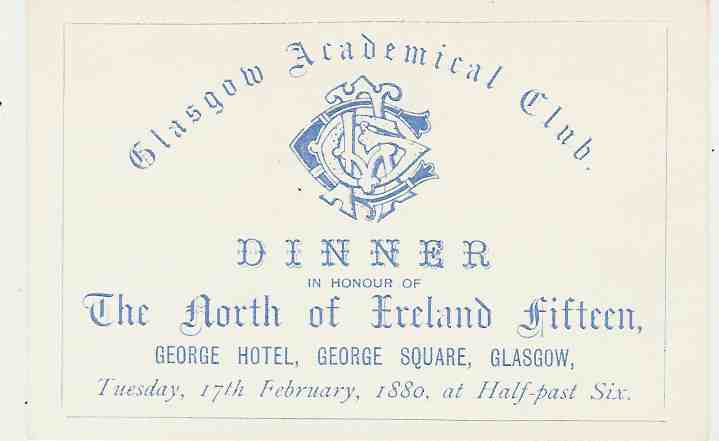
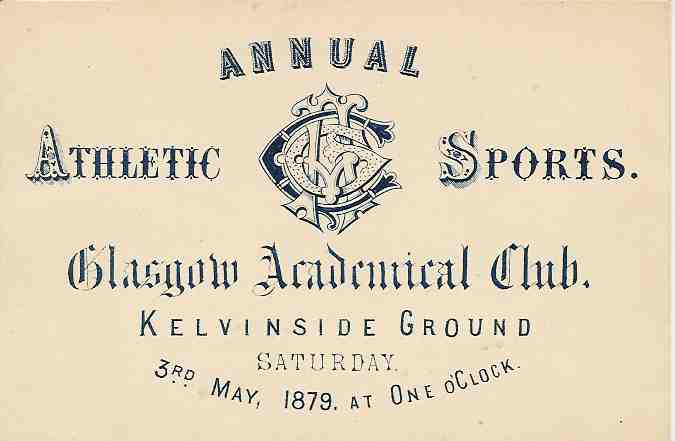
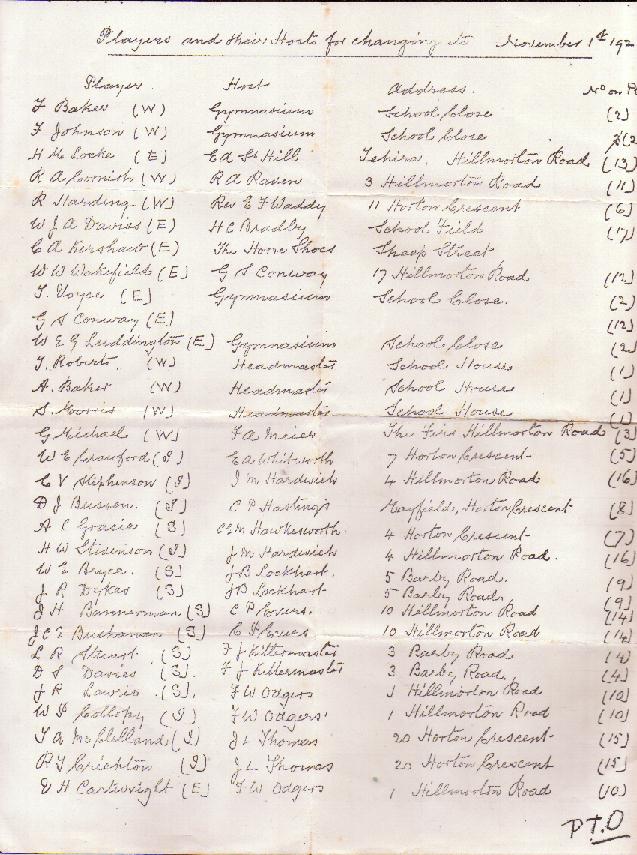


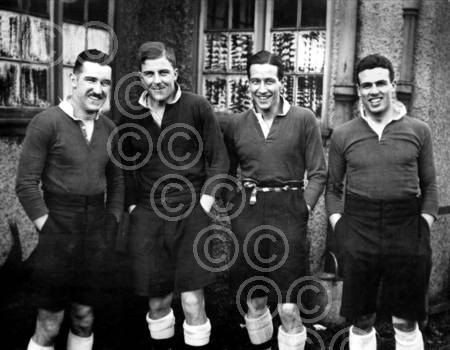





![First International match Scotland V England 1871 [click to close]](../images/photos/438.jpg)







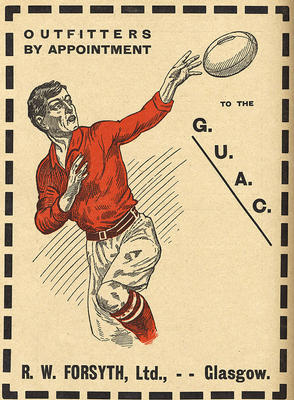















![[click to close]](../images/photos/1763.jpg)